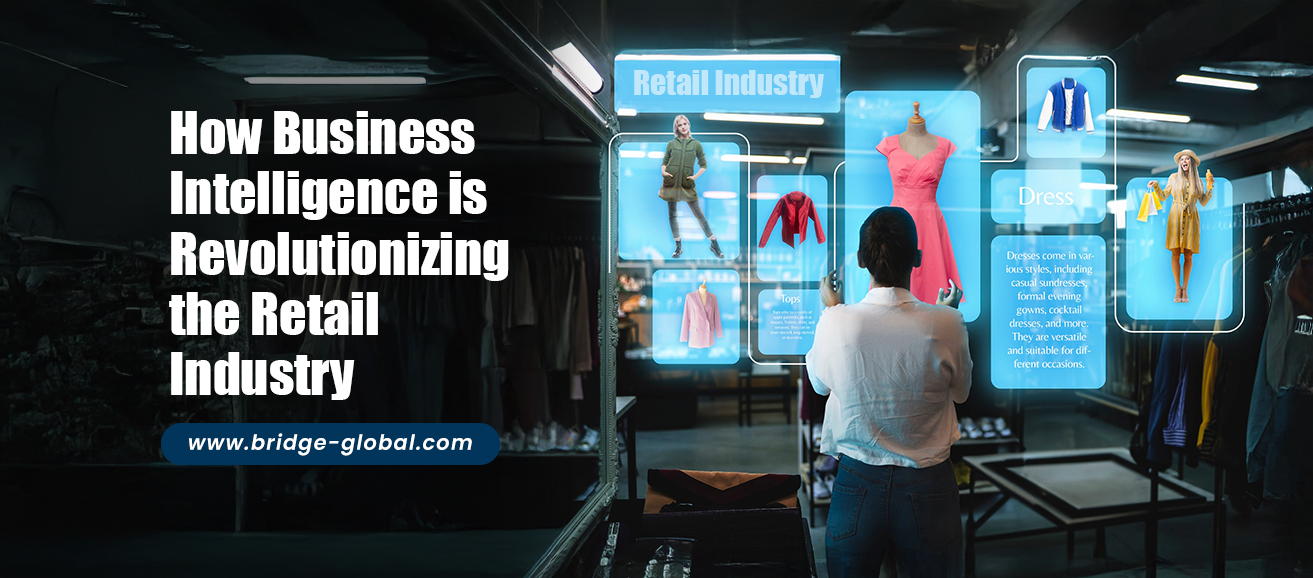Business Intelligence in Retail: Key Benefits, Applications, and Tips for Success
The retail industry is transforming remarkably, fueled by advanced analytics and artificial intelligence (AI). Key drivers behind this growth include the rapid expansion of ecommerce, the widespread adoption of omnichannel retail strategies, and the sheer volume of data being generated daily. In this data-rich landscape, business intelligence in retail has emerged as a true game-changer. It equips retailers with actionable insights to navigate the competitive market and deliver exceptional customer experiences.
In this blog, we'll explore the importance of business intelligence in retail, the benefits it brings, key strategies for retail success through BI, and the emerging trends that are shaping its future. Let’s uncover how BI paves the way for smarter, more successful retail strategies!
Retail Business Intelligence Explained
Retail business intelligence leverages advanced data analytics tools to gather, analyze, and interpret information from multiple retail sources. This allows businesses to uncover crucial insights into customer behavior, sales patterns, inventory management, etc.
In today’s fast-evolving market, where consumer expectations are constantly shifting, the ability to make strategic, data-driven decisions is more crucial than ever. By turning raw data into actionable insights, retail business intelligence solutions empower businesses to stay ahead of the competition. From optimizing operations and streamlining decision-making to delivering exceptional customer experiences, BI is a game-changer for modern retail.
Advantages of Business Intelligence in Retail
Business intelligence brings a wealth of advantages to the retail industry. Here are some of the most significant benefits:
- Enhanced decision-making – With BI, retailers gain data-driven insights that lead to smarter, more strategic decisions, whether it's fine-tuning product offerings or pinpointing the best times for promotions.
- Improved customer experience – By understanding customer preferences and behaviors, you can customize your offerings to create a more personalized and rewarding shopping journey.
- Boosted efficiency – BI tools help streamline operations by optimizing inventory control, minimizing waste, and improving supply chain performance.
- Competitive edge – The ability to swiftly analyze and act on data gives retailers a major advantage. With BI, businesses can stay ahead of market trends and more effectively meet consumer demands.
- Cost savings – By uncovering inefficiencies and pinpointing areas for improvement, BI helps retailers reduce costs, such as minimizing excess inventory and optimizing staffing, ultimately boosting profitability.
- Improved inventory control – BI tools deliver real-time data on stock levels, sales patterns, and demand predictions, enabling retailers to manage inventory more efficiently and avoid stockouts or overstocking.
- Sales enhancement – By analyzing sales data, you can uncover opportunities to boost revenue through tailored promotions, cross-selling, and upselling strategies.
Future readiness – BI allows retailers to predict upcoming trends and take proactive measures, ensuring sustained success in an ever-evolving market.
Common Applications of Retail Business Intelligence Solutions
Retailers utilize business intelligence in a variety of ways to enhance operations and deliver better customer experiences. Here are some of the most common applications:
Personalized Shopping Experience
Creating a great shopping experience starts with understanding your customers. By analyzing their browsing and buying behaviors, retailers can identify preferences like favored products, shopping channels, and brand choices. This insight allows for personalized offers, cross-selling, and up-selling opportunities. Retailers can then use tailored promotions and loyalty programs to engage customers, encouraging repeat business and enhancing the overall customer journey.

Effective Marketing Campaigns
Retailers can leverage business intelligence (BI) to transform data gathered from hundreds of transactions into effective marketing strategies. BI helps identify key insights, such as best-selling products, customer demographics, and top-performing stores. With this data, retailers can fine-tune marketing campaigns, personalize messages, and predict buying trends, leading to more targeted and confident marketing initiatives.
Supply Chain Optimization
Business intelligence solutions enable retailers to extract valuable insights from daily operational data, helping identify and address logistical bottlenecks. This leads to more efficient and streamlined supply chain management. Organizations that use retail business intelligence (BI) to optimize their supply chain operations can significantly reduce supply chain costs.
Enhanced Inventory Management
Retailers can avoid the risks of overstocking and understocking with business intelligence solutions that offer a centralized database of the entire inventory and customer data. By analyzing real-time information from sources like POS systems and ERPs, retailers can identify demand patterns, adjust inventory allocation, clear slow-moving products, and make accurate stock projections to optimize inventory management.
Price Optimization
Customers today compare prices online and seek value for money, making price optimization critical for retailers. Business intelligence (BI) helps retailers set the right price by analyzing factors like seasonality, market trends, competitor pricing, and customer buying patterns. With BI, retailers can adjust prices dynamically to maximize revenue while offering competitive value, ensuring pricing decisions are data-driven and a continuous process.
Customer Segmentation
Customer segmentation is a key application of business intelligence in retail, where customers are grouped based on their behaviors, preferences, and purchasing patterns. By analyzing this data, retailers can design tailored marketing campaigns and promotions that effectively engage each customer group.
Key Features a Retail BI Solution Must Have
Let's dive into the key elements of a successful retail business intelligence solution.
- Data integration enables the collection and consolidation of information from various sources, such as sales transactions, inventory, customer data, and social media, into a unified dataset for informed decision-making.
- Data visualization transforms complex data into visual formats like charts, graphs, and maps, making it easier for decision-makers to interpret and analyze. By turning raw numbers into clear, visual insights, retail data visualization simplifies understanding and helps in making informed business decisions.

Data security safeguards sensitive retail information from unauthorized access, while compliance ensures adherence to regulations like GDPR and PCI DSS. Protecting customer data is essential to avoid fines and maintain trust.
Data catalogs function like organized libraries, enabling users to easily find and access analytics content. They simplify data access, making your BI solution more efficient.
Augmented analytics streamlines complex data analysis, enabling you to uncover valuable insights faster.
Natural language support uses Natural Language Query (NLQ) to allow users to interact with data in plain language, making analytics accessible and empowering even the non-technical users to adopt data-driven insights.
BI Platform Selection: Tips for Retail Success
The business intelligence market offers a wide range of vendors and tools. Retailers seeking a BI solution should begin with a comprehensive assessment of their requirements .Here are key tips for achieving success with retail BI:
- Set clear goals for your retail BI use case.
- Create a solution tailored for the modern retail environment.
- Implement a strong change management plan to gain stakeholder buy-in.
- Hire skilled professionals or work with IT experts for project execution.
- Select a vendor offering full support throughout the BI solution’s lifecycle.
- Don’t overlook post-deployment: establish BI governance policies and data-quality maintenance metrics for long-term success.
The Future of Business Intelligence in Retail
The future of business intelligence (BI) in the retail industry promises transformative advancements, reshaping how businesses operate and make decisions. One major shift will be the integration of advanced AI into BI systems. With growing trust in AI capabilities, BI tools will evolve from merely providing insights to autonomously making critical decisions, such as optimizing pricing strategies or managing inventory levels. This will elevate BI from a decision-support tool to an autonomous driver of business outcomes, requiring minimal human involvement.
Another key development is the rise of edge computing in BI. As retailers adopt IoT devices and in-store sensors, the ability to process data closer to its source becomes essential. Edge computing enables real-time data analysis at the point of collection—whether in stores or distribution centers—minimizing latency and empowering retailers to act on insights instantly.
Ethical AI and responsible data usage will also become pivotal. As AI-powered BI becomes more prevalent, ensuring transparency, fairness, and compliance with data privacy regulations will be critical. Retailers must prioritize clear guidelines for data collection, analysis, and application to prevent biases and maintain trust. This focus on ethics will shape the future development and deployment of BI tools, ensuring they are both powerful and responsible.
Wrapping Up
Business intelligence holds numerous advantages for the retail sector. It improves customer experiences and provides clear insights into trends, which helps businesses become more proficient. By staying on top of retail analytics trends, you can gain a competitive edge and better understand your market.
When you choose business intelligence development services, you are actually relying on a skilled group of experts ready to deploy and provide real intelligence to your business while simultaneously addressing any potential data-related issues. Facing challenges in choosing the right BI tool, developing a BI solution, or understanding how BI as a service can drive your business forward? Let experts guide you with insights and customized support.



